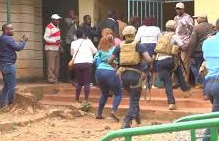
The State has defended the arrest and prosecution of two Democratic Congress Party (DCP) youth officials facing terrorism-related charges, insisting that their apprehension followed due legal process and did not amount to abduction as claimed by the defence.
Appearing before the Kahawa Law Courts on Tuesday, the prosecution, led by counsel Kamau, told the court that Peter Kawanjiru and Wanjiku Thiga, who are accused of malicious damage to public property and violence during the June 25 protests, were lawfully arrested and brought to court within the constitutional time limits.
"This was not an abduction, as has been alleged. It was a lawful arrest carried out under provisions of the law," the prosecution said.
He cited Sections 36 and 37 of the Criminal Procedure Code, which allow police to arrest without a warrant and require that suspects be presented before a court within a reasonable time.
The State was responding to arguments raised by defence lawyers, including Kibe Mungai and Ndegwa Njiru, who alleged that anti-terror officers had defied court orders that had earlier granted bail to the two accused in separate rulings issued by the Ruiru and Kiambu courts.
They claimed that despite valid court orders setting the respondents free, they were rearrested on Friday and brought to Kahawa without any fresh warrants.
“Once a person has been admitted to bail, the bare minimum is that they must sleep in their own bed, not in a cell. What happened here is contempt of court,” the lawyers stated.
The defence further alleged that the accused were abducted by anti-terrorism officers, in a move they termed unconstitutional and politically motivated.
Kawanjiru, through his lawyer Njiru, alleged he was tear-gassed while in custody, and an officer allegedly made threatening remarks—a matter the prosecution dismissed, urging the court not to rely on hearsay.
“If those allegations are serious, let them file a sworn affidavit. We cannot proceed on the basis of unverified claims,” the State submitted.
The prosecution insisted that the charges, including terrorism, were properly brought and that any complaints about excessive force or procedural violations should be addressed during trial.
“There’s no greater force than necessary that should be used, but if there were, it is a matter for trial. What we’re dealing with now is whether the accused should take a plea,” the prosecution added.
The court is expected to rule on preliminary objections raised by the defence and decide on plea-taking.















